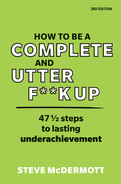Step
8
Don’t plan your priorities
Two factors drive how we spend our time. First there are those things that are Urgent – which is best described as the feeling of “I must do it now” (tense, pressured, some might say exhilarating). Then there are those things that are Important – these are activities that contribute significantly to our goals and have a long-term impact. Knowing this we can now categorise time and our activities in four ways:
1. Fire fighting (Urgent and Important)
This is the category where you are constantly reacting to what’s going on. Stuff that you didn’t plan for, that’s got to be done now. Irate clients, phones ringing, people walking into your office and resigning out of the blue, crying children, heart surgery, crisis. Because you don’t take time to prioritise, you are mostly reactive, driven by the tyranny of the urgent. By the way, some of the best fire fighters are also some of the best arsonists. They are so addicted to the buzz of the urgent, and like to be seen as stepping in and saving things at the last possible moment, that they often start the fires in the first place.

Figure 3 Where do you spend most of your time?
2. Fire prevention (Important not Urgent)
The category of quality. The more time you spend in here, the less time you’ll need to spend in category 1. Activities in here include things to do with the long term such as planning, innovation, vision, training and even physical exercise. This is where you can head things off at the pass before they become critical and move over to category 1. The things in here don’t act on us, we have to act on them. All these activities can be put off so we have to make ourselves do them. But seeing that, on average, you’ll be interrupted every nine minutes, there’s fat chance of that.
3. False alarms (Urgent not Important)
This is the category of deception. It feels just like category 1. You are fooled by the noise of urgency. For example, people running into your office and screaming in a high-pitched voice that “we’ve got a problem” creates the illusion that this is important when in reality it’s only urgent. And usually just to them.
4. Fire escape (Not Important not Urgent)
Escape activities like idle chat and trips to the coffee machine. Doing anything rather than what needs doing. It’s nice here, isn’t it?
